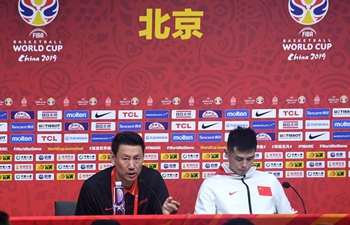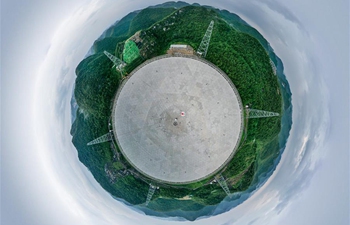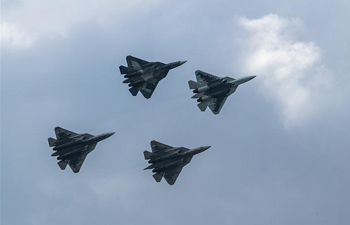
Italian President Sergio Mattarella speaks to the media after a meeting with Giuseppe Conte in Rome, Italy, on Sept. 4, 2019. The last major hurdle that could have blocked Giuseppe Conte from forming Italy's 67th government since World War II has disappeared, after the populist Five-Star Movement overwhelmingly voted Tuesday for the party's coalition with a political rival. (Photo by Alberto Lingria/Xinhua)
ROME, Sept. 3 (Xinhua) -- The last major hurdle that could have blocked Giuseppe Conte from forming Italy's 67th government since World War II has disappeared, after the populist Five-Star Movement overwhelmingly voted Tuesday for the party's coalition with a political rival.
Some analysts said the vote also weakened Luigi Di Maio and Matteo Salvini, leaders of the Five-Star Movement and the nationalist right-wing League, respectively. The two parties formed the previous coalition government.
Di Maio on Tuesday opted for an online vote with his party members and expected to gauge their support for an alliance with the center-left Democratic Party, the Five-Star Movement's top political rival.
Among nearly 80,000 votes, 79.3 percent were in favor of the coalition, 20.7 percent against, the party tweeted on its official account.
According to Luca Verzichelli, a political science professor at the University of Siena, the nearly four-to-one margin was good news for the proposed government.
"This vote legitimizes the new government before it takes office," Verzichelli told Xinhua.
"The alliance between the Five-Star Movement and the Democratic Party with Conte as prime minister was never going to be an easy fit. But this is a good start," he added.
In late August, Conte, who belongs to no party but is close to the Five-Star Movement, resigned as Italian prime minister, after the collapse of the 14-month coalition between the Five-Star Movement and the League, as the latter promoted a motion of no-confidence.
On Aug. 28, Italian President Sergio Mattarella asked Conte to form a new cabinet between the Five-Star Movement and the Democratic Party.
There will be several steps before Conte is seated as prime minister of the new government.
For example, the two parties must finalize a joint governmental program, and Conte must present Mattarella with a list of candidates for nearly three dozen minister-level posts, some of which will be filled by members of the two parties and some by political independents or technocrats.
Once Mattarella approves the list, the government will present itself to the parliament for approval.
If there is no defection among members of the Five-Star Movement and the Democratic Party, the alliance will have enough votes for a majority in the Chamber of Deputies.
In the upper house of parliament, or the Senate, the alliance will need at least three members of the second-tier parties to join them in order to reach a majority.
The Senate vote will act as a referendum on Conte's leadership, according to Luigi Curini, a political science professor at the State University of Milan.
"Tuesday's vote by members of the Five-Star Movement was a vote on the party's alliance with the Democratic Party, and the result sent a strong signal," Curini said.
"We will know more about support for Conte when the Senate votes. If the new government wins a strong victory there, that would be a strong mandate for Conte as prime minister," he said.
Some analysts said Salvini is the biggest loser in Tuesday's vote. Though he still heads what opinion polls say is Italy's largest political party, Salvini and his League will remain in the political opposition as long as the Conte administration is in office.
Meanwhile, analysts also said Di Maio was also diminished by Tuesday's vote.
Di Maio had been "skeptical" of his party's link with the Democratic Party, but the vote made it clear that a large chunk of the party's most active members did not share that view, according to Federico Castorina, president of the think tank Cultura Democratica.
"This vote strengthens the soon-to-be Conte government but it weakens Di Maio," Castorina told Xinhua. "Things could change, but right now other party figures will gain influence at Di Maio's expense, and Di Maio's critics can say he does not reflect the views of the Five-Star Movement in general."











